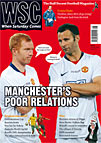 Cameron Carter sits through Goal III
Cameron Carter sits through Goal III
A quick fast-forward to the end credits of a film will tell you all you need to know about the project. In the case of Goal III, the third in a footballing trilogy – let us hope it is a trilogy – the character list is an absolute giveaway. “Mad Film Director”, “Cute Masseuse”, “Old Masseuse”, “Irate Skoda Driver” and “Bucharest Boiler” all point towards an artist that employs, shall we say, broad brush strokes. On actually watching this film it would appear that the holders of the brush are a FIFA committee and a couple of Hollyoaks writers.
Goal I and Goal II told of the rise of Mexican Santiago Muñez, from barefoot obscurity to Newcastle’s first team, then to Real Madrid and European glory, picking up Anna Friel on the way. Imagine then the surprise and horror of Goal devotees, on discovering that the final instalment revolves around two new English players who suddenly hit centre stage while Santiago merely hangs about sensitively in the background like an expert bell-hop. The Latin American audience appears to have been sacrificed in favour of the European one as Liam Adams and Charlie Braithwaite bring their own personal problems (surreptitious alcoholism and lack of facial expression, respectively) to the fore.
The acting and direction are strictly soap opera. If Charlie, for example, spots too late that Liam has a secret sorrow, and only asks if everything is OK as his friend brushes past him out the door, Charlie, alone with his thoughts, will look to his left, frown, look to his right and wait for the command “Cut”. The acting, though, is not the weakest point. The story, in order to arrive at its set-piece dramatic or comedy moments, takes liberties with the suspension of disbelief that we all try so hard at to help a film along. Apparently Charlie accepts a role in a film without knowing which country he will be visiting or the role he is to play. As it turns out, he ends up with his chums in a humorously impoverished eastern European country, portraying a vampire gimp in a thong. The comedy and romance scenes that ensue may be feeble, but they are like Shakespeare in comparison to the tacked-on sub-plot of four Geordie boys following England to Germany for the World Cup. Of course it helps a writer enormously if one of the comedy characters is stupid, but to allow the exchange “Right lads, Deutschland here we come!”/“I thought we were going to Germany?” to survive the editing process is carelessness bordering on cynicism.
By this stage of the franchise, there are no walk-on parts for the real players. The characters’ only interaction with them is through green screen technology – not brilliantly realised – which is spliced with actual match footage from the 2006 World Cup. This footage, shot from an unfamiliar standpoint, provides the best part of the film. The few seconds of David Beckham preparing, taking and then watching his successful free-kick against Ecuador are the more memorable because this camera never leaves Beckham’s face through the entire process.
The downside is that when Liam misses a crucial penalty we see the real England players commiserating with each other but no one comes anywhere near him. This makes him look more unpopular than tragic – possibly not what the director intended. When the football action is over, all we are left with is a plodding plot with uncharismatic characters, the comic relief scenes of which only serve to make one yearn for the plodding plot with uncharismatic characters.
It seems too easy to criticise a film about football because the very genre is a sickly, writhing mis-birth, but this is a sequel to a sequel to a bad film and was hurried through straight to DVD like someone trying to smuggle their own drink into a pub. Goal III is possibly aimed at teenage half-fans who take up the scarves and rattle every four years. They have the resilience and time to recover from it. Please don’t try watching it yourself.
From WSC 270 August 2009